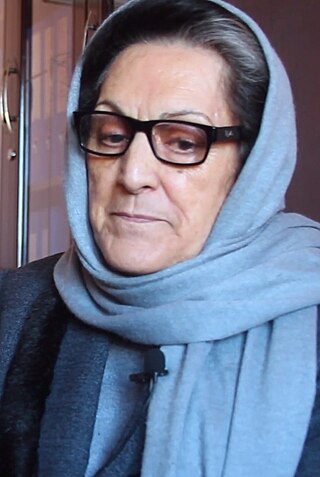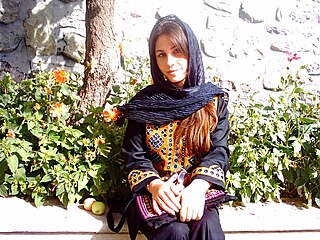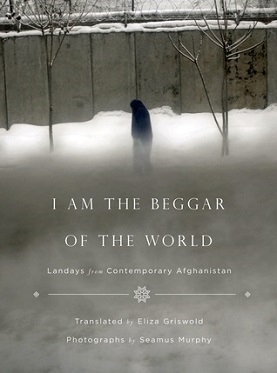Related Research Articles

Mazar-i-Sharīf, also known as Mazar-e Sharīf or simply Mazar, is the fifth-largest city in Afghanistan by population, with an estimated 500,207 residents in 2021. It is the capital of Balkh province and is linked by highways with Kunduz in the east, Kabul in the southeast, Herat in the southwest and Termez, Uzbekistan in the north. It is about 55 km (34 mi) from the Uzbek border. The city is also a tourist attraction because of its famous shrines as well as the Islamic and Hellenistic archeological sites. The ancient city of Balkh is also nearby.

Gulbuddin Hekmatyar is an Afghan politician, and former mujahideen leader and drug trafficker. He is the founder and current leader of the Hezb-e-Islami Gulbuddin political party, so called after Mohammad Yunus Khalis split from Hezbi Islami in 1979 to found Hezb-i Islami Khalis. He twice served as prime minister during the 1990s.
The following lists events that happened during 1996 in Afghanistan.

Abdul Rahman Pazhwak was an Afghan poet and diplomat. He was educated in Afghanistan and started his career as a journalist, later joining the foreign ministry. During the 1950s, he became ambassador to the United Nations and served as president of the UN General Assembly from 1966 to 1967. During the early 1970s, he served for short periods as Afghan ambassador to West Germany and India. In 1976, he became ambassador to the United Kingdom. He served in that position until the 1978 Saur Revolution. He then returned to Afghanistan and was put under house arrest. He was allowed to leave for medical treatment in 1982 and received asylum in the United States, where he lived until 1991, before moving to Peshawar, after Pakistan offered him sanctuary. Abdul Rahman Pazhwak died in Hayatabad in Peshawar on 8 June 1995. He was in Baghwani village off Surkh Road in Nangarhar Province, Afghanistan.

The Hezb-e-Islami Gulbuddin, also referred to as Hezb-e-Islami or Hezb-i-Islami Afghanistan (HIA), is an Afghan political party and paramilitary organization, originally founded in 1976 as Hezb-e-Islami and led by Gulbuddin Hekmatyar. In 1979, Mulavi Younas Khalis split with Hekmatyar and established his own group, which became known as Hezb-i Islami Khalis; the remaining part of Hezb-e Islami, still headed by Hekmatyar, became known as Hezb-e Islami Gulbuddin. Hezbi Islami seeks to emulate the Muslim Brotherhood and to replace the various tribal factions of Afghanistan with one unified Islamic state. This puts them at odds with the more tribe-oriented Taliban.

Eliza Griswold is a Pulitzer Prize–winning American journalist and poet. Griswold is currently a contributing writer to The New Yorker and a Distinguished Writer in Residence at New York University. She is the author of Amity and Prosperity: One Family and the Fracturing of America, which was awarded the Pulitzer Prize for general nonfiction and the Ridenhour Book Prize in 2019, and which was a 2018 New York Times Notable Book and a Times Critics' Pick. Griswold was a fellow at the New America Foundation from 2008 to 2010 and won a 2010 Rome Prize from the American Academy of Arts and Letters. She is a former Nieman Fellow and a current Berggruen Fellow at Harvard Divinity School, and has been published in The New Yorker, Harper's Magazine, and the New York Times Magazine.

Women's rights in Afghanistan are severely restricted by the Taliban. In 2023, the United Nations termed Afghanistan as the world's most repressive country for women. Since the US troops withdrawal from Afghanistan in 2021, the Taliban gradually imposed restrictions on women's freedom of movement, education, and employment. Women are banned from studying in secondary schools and universities, making Afghanistan the only country to prohibit females from studying beyond the sixth grade. Women are not allowed in parks, gyms, or beauty salons. They are forbidden from going outside for a walk or exercise, from speaking or showing any part of their face or body outside the home, or even from singing or reading from within their own homes if they could be heard by strangers outside. In extreme cases, women have reportedly been subjected to gang-rape and torture in Taliban prisons.
Sahira Sharif is an Afghan politician who was elected to represent Khost Province in Afghanistan's Wolesi Jirga, the lower house of its National Legislature, in 2005.
Ghairat Baheer is a citizen of Afghanistan who served as a Senator in the House of Elders of Afghanistan. He is also the Chairman of the Political Committee of Hezbi Islami in Afghanistan. Ghairat Baheer was held by American forces in extrajudicial detention for over six years. The BBC News reported Pakistani officials took him into custody during a pre-dawn raid on his home in Islamabad on October 30, 2002. The BBC said no reason was offered for his apprehension, and that there were rumors US security officials participated in the raid.
2003 in Afghanistan. A list of notable incidents in Afghanistan during 2003

Manizha Bakhtari is an Afghan diplomat, author and journalist renowned for her contributions to the country's literary and political landscape. She is currently the Afghan Ambassador to Austria, leading one of Afghanistan's most significant diplomatic representations. Bakhtari previously served as the country's Ambassador to the Nordic countries, as well as the Chief of Staff for Afghanistan's Ministry of Foreign Affairs.

Mohammad Sharif Saiidi is a poet from Afghanistan.

Shafiqa Habibi is a journalist, television anchor, activist, and politician from Afghanistan. She is known for her work to support women journalists, and for her 2004 candidacy for Vice President of Afghanistan as the running mate of Abdul Rashid Dostum.

Homeira Qaderi born in 1980 is an Afghan writer, advocate for women's rights, and professor of Persian literature, currently serving as a Robert G. James Scholar Fellow at Radcliffe Institute of Advanced Research, Harvard University.
Muassasa-i Khayriyya-i Zanan, also known as the 'Women's Society' and from 1975 called (Afghan) Women's Institute (WI), was a women's organization in Afghanistan, founded in 1946. It was also known as Da Mirmanech Tulaneh or Da Mermeno Tolana (DMT). It became independent of the government in 1975 and was renamed the "(Afghan) Women's Institute" or WI. From 1953, it published its own publication, Mirman.
The People's Peace Movement or Helmand Peace Convoy is a nonviolent resistance grassroots group in Afghanistan, created in March 2018 after a suicide car bomb attack on 19 March in Lashkargah, Helmand Province. The PPM calls for the military forces of both the government of Afghanistan and the Taliban to implement a ceasefire and advance the Afghan peace process. The group marched across Afghanistan to Kabul, where it met leaders of both parties and conducted sit-ins in front of diplomatic posts, before continuing its march to Balkh and Mazar-i-Sharif, arriving in September 2018.

The Taliban has ruled Afghanistan as the Islamic Emirate of Afghanistan since taking control by force in 2021, overthrowing the internationally recognized Islamic Republic of Afghanistan. The takeover was widely criticized by the international community, and no countries have extended de jure diplomatic recognition to the new regime, despite nominally maintaining relations with Afghanistan. The Taliban has campaigned for international recognition since the takeover. Several countries have vowed never to recognize the Islamic Emirate, and others have said they will do so only if human rights in the country are respected. Some countries have accredited Taliban diplomats at the chargé d'affaires level despite not recognizing the Islamic Emirate. In September 2023, the People's Republic of China became the first country to formally name a new ambassador to the country since the takeover, and in January 2024 recognized the Taliban's envoy to China; however, the PRC still does not formally recognize the Taliban as the legitimate government of Afghanistan. The United Arab Emirates also accepted a Taliban appointed diplomat as Afghanistan's new ambassador in August 2024.

I Am the Beggar of the World: Landays from Contemporary Afghanistan is a 2014 collection of over 100 landays written by female Afghans, and translated into English by Eliza Griswold. The book also includes images taken by Seamus Murphy. The collection was generally well received, winning the 2014 PEN Award for Poetry in Translation. Critics praised the window the poems offered into the lives of women in Afghanistan as well as Murphy's photographs and other contextual materials included by Griswold.
Khalida Furugh is an Afghan poet and academic. She is considered one of the country's leading female poets.
References
- 1 2 "Inside the Poetry Societies Helping Afghan Women Find Community". Time. Retrieved 2021-10-30.
- 1 2 3 4 Griswold, Eliza (2012-04-27). "Why Afghan Women Risk Death to Write Poetry". The New York Times. ISSN 0362-4331 . Retrieved 2021-10-30.
- 1 2 Griswold, Eliza (November 16, 2016). "The 22 syllables that can get you killed". BBC . Retrieved 28 January 2022.
- ↑ "Love, rage and silence: The secret lives of Afghanistan's female poets". Dawn . Agence France-Presse. February 17, 2016. Retrieved 28 January 2022.
- ↑ Cuen, Leigh (July 22, 2013). "Afghan women write powerful poetry – even amid war". The Christian Science Monitor . Retrieved 28 January 2022.
- ↑ Doucet, Lyse (October 21, 2013). "Dangerous 'truth': The Kabul women's poetry club". BBC News . Retrieved 28 January 2022.
- 1 2 "Love, poetry and war: the Afghan women risking all for verse". the Guardian. 2015-06-06. Retrieved 2021-10-30.